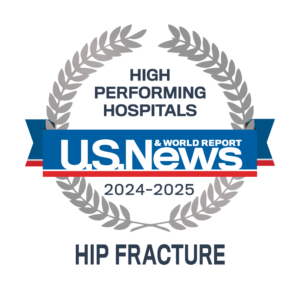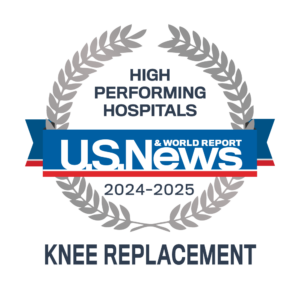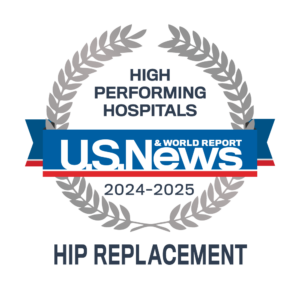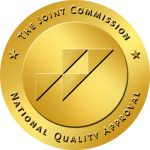Sports Medicine
The orthopedic surgeons on the medical staff at Baylor Frisco have experience working with athletes at the high school, college, semi-pro, and professional levels. Do you run? Do you jump? Are you active? Sports Medicine isn’t just for athletes but also for those who are active and affected by injuries associated with their sport. Our surgeons can treat most sports injuries here locally, especially those affecting the knees, hips, ankles, and shoulders.
When should I see a sports medicine doctor?
• If you suspect you have a fracture or ligament injury
• If you have an injury that requires crutches or a sling
• If you have pain or dysfunction, especially lasting more than ten days
Athletes and active people ask more of their bodies than the average person. So an injury comes with higher stakes. Prompt diagnosis and treatment can help athletes return to full function as soon as possible. On the other hand, continuing to train through an untreated injury can cause further problems.
Evaluation by an orthopedist experienced in sports medicine can identify injuries that won’t get better with time. For example, is your knee just strained, or is the pain caused by a torn meniscus? Did you sprain your ankle, or do you have a hairline fracture?
After a sports injury, it may take an X-ray, MRI, or other imaging studies to determine if the damage is only a strain or sprain or if it is something more serious, such as a fracture or torn ligament, or meniscus that could lead to future problems if not addressed. Sports Medicine doctors at Baylor Scott & White offer treatment options for sports-related injuries to the knee, foot, ankle, shoulder, elbow, hand, wrist, and head. You can receive care for a variety of conditions, including:
- Knee injuries. Knee pain, stiffness, and swelling can prevent you from doing the activities you love. If your knee is swollen, stiff, can’t hold weight or made a popping sound at the time of injury, it’s time to seek medical advice. Injuries can include:
- Meniscus & ligament (ACL, MCL, PCL) tears
- Other knee injuries (sprain, runner’s knee, kneecap injury,
- Ankle & foot injuries. Pain in your ankle or foot can put your life on hold. If your ankle or foot cannot hold weight or made a popping sound at the time of your injury, it’s time to seek medical advice. Injuries can include:
- Ankle & foot sprains, fractures, Achilles ruptures
- Tendonitis
- Shoulder & elbow injuries. If you’re experiencing shoulder or elbow stiffness, swelling, or constant pain that isn’t relieved by rest or ice, it’s time to seek care from a medical professional. Injuries can include:
- Joint separation
- Shoulder injuries (tear, sprain, dislocated shoulder)
- Tennis elbow
- Hand & wrist injuries. Pain, numbness, and stiffness in your hands and wrists can severely limit your ability to function by making everyday tasks challenging. Injuries can include:
- Hand & wrist sprains, fractures, dislocation
You have come to the right place! We are a certified Center of Excellence in Hip, Knee, Shoulder, and Spine Surgery, designated by The Joint Commission.





Find a Doctor
If you are in need of a physician, we can help! Have a look at our directory of doctors & surgeons.
Prepare for a Procedure
View our digital guides so you can confidently navigate your upcoming medical procedure.
Resources for Patients
Access our curated resources designed to empower and assist you throughout your care.
Resources for Visitors
We've curated essential details to enhance your visit and make your time here as informative and stress-free as possible.
FAQs
Sports Medicine is a medical practice where orthopedic physicians focus on treating and preventing injuries that happen as a result of playing sports or engaging in other physical activities.
Where doctors that practice general medicine will deal with the everyday injuries that occur from everyday life events, a doctor that specializes in sports medicine will be accustomed to treating athletes such as NFL players that have been injured during games.
Sports Medicine Doctors have been extensively trained in the field of sports injuries. Whether the injury was the result of playing a sport, or from another form of physical activity a sports medicine doctor will be familiar with the type of injuries that can occur from high-impact physical contact, and how to help them heal as quickly as possible.
Some of the injuries sports medicine doctors treat are:
- Fractures
- Sprains
- Concussions
- Torn ligaments
In many cases, an athlete will play an important role in the success of the team that they play on. If they become injured the whole season could be in jeopardy. A sports medicine doctor will focus on rapid healing techniques with an additional focus on helping the player to avoid re-injuring themselves when they go back out on the field.
It is not a secret that physical activities on a regular basis help to maintain a higher level of health. People that like to stay active tend to become injured from time to time. Injuries from physical activities are not entirely the same as injuries from accidents and other mishaps.
Sports medicine is a practice that not only focuses on the immediate injury but also the prevention of injuries that could stem from the initial injury.
- Promotes health and vitality
- Injury prevention
- Ongoing physical care
A step further, a sports medicine doctor will take a deep look into the whole physiology of the patient and identify any other underlying conditions that could eventually cause injury.
A medical practice that focuses on keeping the patient healthy and active as much and as long as possible is important for the health of all people that strive to stay active and in good health.
This is a difficult question to answer in an exact nature. According to ASPETAR, the world’s first official sports medicine practice was formed in Dresden, Germany in 1911. However, there is evidence that suggests that the Ancient Egyptians were the pioneers that started the entire medicinal industry.
The difference between sports medicine and many other common medicinal practices is that sports medicine incorporates a wide variety of other medical practices, concepts, as well as homeopathic techniques.
Sports medicine is a branch of medical practices that incorporate a large variety of techniques, strategies, and treatments into its methodology. As for athletic training, it is only one part of an entire whole. Where sports medicine uses athletic training as one of the components to promote health and healing, athletic training specifically focuses on the training aspect of sports medicine.
